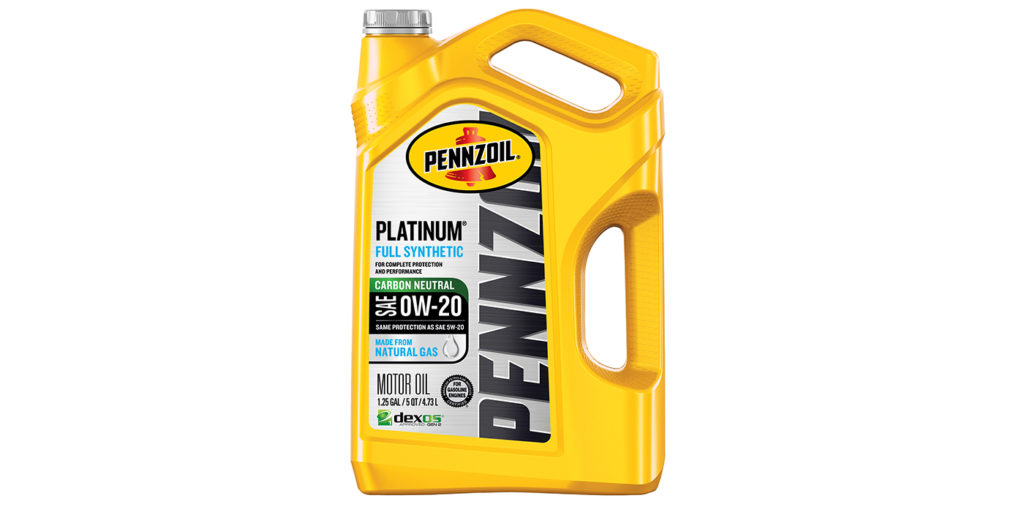Pennzoil has announced it will offer customers carbon neutral lubricants for passenger cars in North America. Existing products within the Pennzoil Platinum line of full synthetic motor oils are carbon neutral as a step toward Shell’s target to be a net-zero emissions energy business by 2050 or sooner, in step with society and with its customers.
Pennzoil is just one of the brands within the Shell global portfolio of lubricants that is committing to providing motorists with carbon neutral[1]alternatives. Globally, Shell aims to offset the annual emissions of more than 52 million gallons of advanced synthetic lubricants, expecting to compensate around 700,000 tonnes of carbon dioxide equivalent (CO2e) emissions per year, which is equivalent to taking approximately 340,000 cars off the road for one year[2].
“Motorists are more conscious of contributing to a more sustainable lifestyle and are looking for ways to reduce their net carbon footprint,” said Machteld de Haan, CEO of Pennzoil-Quaker State Company and vice president Shell Lubricants Americas. “As one of the brands from the world’s leading lubricants supplier, Pennzoil is proud to be a part of the largest carbon neutral program in the lubricants industry; one that compensates for the full lifecycle emissions of these select products. Our carbon neutral lubricants will provide motorists with less carbon intense choices without having to compromise the high performance and engine protection that they expect from Pennzoil.”
Shell aims to be a net-zero emissions energy business by 2050 or sooner, in step with society, however no one solution is going to allow Shell to achieve this target. The transition to a low-carbon energy future will require a range of solutions and Pennzoil is dedicated to helping drive the future and providing carbon neutral alternatives. To achieve this, Pennzoil will contribute to Shell’s target to be a net-zero emissions energy business through several factors: avoid emissions, reduce emissions and offset emissions. about:blank
One of the ways Shell plans to avoid emissions is by optimizing efficiency during production and design of our products by using more recycled content in its bottles, where possible. Shell will reduce emissions by a number of avenues, including improved energy efficiency. More than 50% of electricity in our Shell Lubricant Blending Plants now comes from renewable sources. Lastly, Shell will offset the remaining CO2e emissions through buying and selling carbon credits from Shell’s global portfolio of nature-based solutions projects, and continued investment in nature-based solutions initiatives.
While measures to avoid and reduce emissions offer the best way to tackle emissions in the long term, until scalable solutions are deployed, carbon offsetting programs provide an immediate solution to balance CO2e emissions. Shell’s global portfolio of nature-based carbon credits[3]will compensate CO2e emissions from the entire lifecycle of these products, including the raw materials, packaging, production, distribution, customer use and product end of life.
Pennzoil has integrated carbon neutral products into the existing full synthetic product portfolio without sacrificing engine performance or protection. In North America, Pennzoil will offset the emissions from the Pennzoil Platinum line of full synthetic motor oils including:
- Pennzoil Ultra Platinum Full Synthetic Motor Oil: SAE 0W-20 and 0W-40
- Pennzoil Platinum Full Synthetic Motor Oil: SAE 0W-16 and SAE 0W-20
- Pennzoil Platinum High Mileage Full Synthetic Motor Oil: SAE 0W-20
- Pennzoil Platinum Euro Full Synthetic Motor Oil: SAE 0W-30 and SAE 0W-40
In recent years regulators have proposed substantially higher fuel economy standards and vehicle manufacturers have focused on increasing fuel economy range. With these changes, engines are now designed to run on thinner motor oils compared to older engines which typically run on 5W-20, 5W-30 or even 10W-30. Pennzoil has worked hand-in-hand with vehicle manufacturers to develop modern day motor oils which focus on zero-weight (0W) grades, otherwise known as low viscosity oils. Low viscosity motor oils within the Pennzoil Platinum line of full synthetic motor oils are engineered to achieve better fuel economy[4].
Throughout 2021, Pennzoil will inform motorists about the benefits of choosing a carbon neutral product through a variety of touchpoints. Pennzoil will begin by hosting a virtual panel discussion to introduce these sustainability solutions to meet the challenges within the automotive aftermarket industry for passenger cars of not only today, but also tomorrow. Additional details about the virtual panel discussion will be released closer to the panel date.
[1] The term “Carbon Neutral”, indicates that Shell has engaged in a transaction where an amount of carbon dioxide equivalent associated with the acquisition and pre-processing raw materials, lubricant production, packaging, distribution, and the subsequent use and end of life treatment of the used materials in relation to the Shell Lubricants products, has been removed from the atmosphere through a nature based process, or emissions saved through avoided degradation of natural ecosystems.
2 Actual emissions from driving are sensitive to underlying assumptions. Full disclaimer is available here.
3 Nature-Based Carbon Credit” (or ‘Carbon Credit’) represents one metric tonne of CO2 avoided or removed from the atmosphere, generated by a Nature-Based Project.
4 Compared to conventional motor oils.

